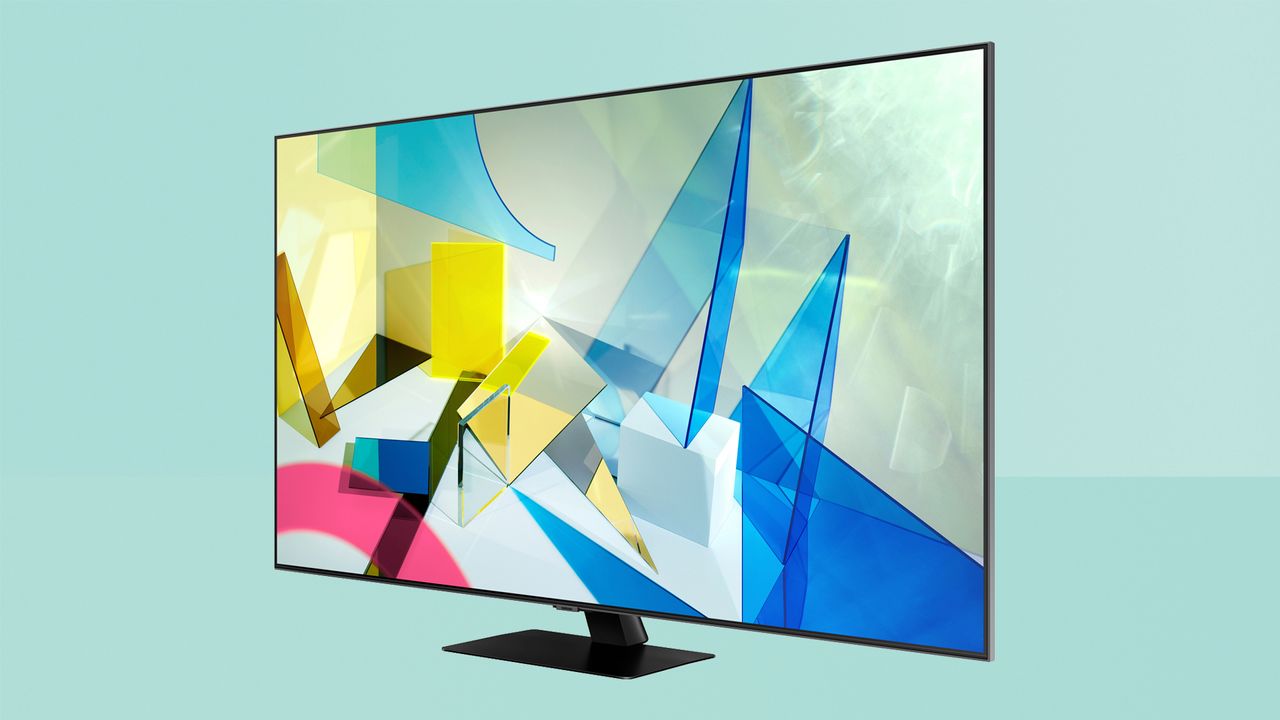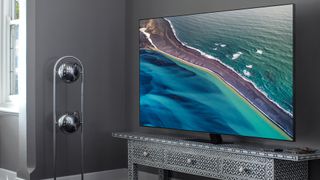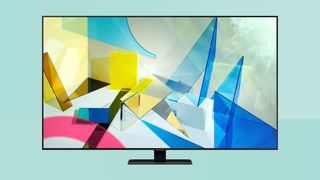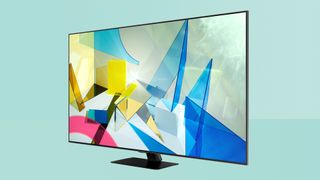Samsung Q80T (QE65Q80T) review: one of the best 4K gaming TVs
The Samsung Q80T is one of the best TVs for the PS5 and Xbox Series X, bringing high-spec 4K QLED TV features at a lower price than Samsung's flagship sets

The Samsung Q80T is a dream for next-gen gaming, and handles movies and TVs with style thanks to its bright screen and top-tier upscaling.
-
+
Beautiful colours
-
+
Strong brightness and contrast
-
+
Incredible gaming chops
-
+
Fantastic upscaling
-
-
No Freeview Play
-
-
No Dolby Vision
-
-
Some blooming from backlight
Why you can trust T3
This Samsung Q80T review is looking at the the most affordable QLED TV from Samsung's 2020 range to offer a full-array backlight, which helps it to deliver brighter HDR and more precise contrast.
It's a justifiable middle ground for buyers looking to bag a high-spec QLED 4K TV of the kind that dominate our list of the best TVs. Available in screen sizes ranging from 49 to 85 inches (we checked out the 65-inch QE65Q80T), the Q80T also boasts the majority of the brand’s most sought-after features like Object Sound Tracking 3D audio, the latest iteration of the Tizen connected TV platform, and advanced gaming tech that's ready for new features in the PlayStation 5 and Xbox One X, making most of its models qualify as some of the best gaming TVs (though these features aren't present in the 49-inch version).
Since the Samsung Q80T came out, interesting things happened in the industry. One of the best OLED TVs dropped in price majorly (the LG BX), and now directly competes with this model as one of the best TVs under £1000, and the incredible rich contrast of OLED is hard to beat. However, the bold QLED panel of the Q80T hits brightness levels that OLED can only dream of, so if you’re shortlisting a premium performer for both home cinema and next-gen gaming, the Q80T remains a very tempting option.
A 2021 replacement model for this set, known as the Samsung Q80A, is now available, but because the Q80T price is now much lower than the launch price of the latest model, it might be just the bargain you're looking for.
Samsung Q80T review: Price and features
The Q80T comes in 49-, 55-, 65-, 75- and 85-inch screen sizes. The original RRP of the 65-inch model we tested was around £2,299/$1,800, but all sizes have now seen major price drops, starting under the £1,000/$1000 barrier.
Check our Samsung discount codes to snap up a saving.
Smart connectivity is via Samsung’s familiar Tizen smart platform, which is well-stocked for streaming services. Ambient Mode, which turns the TV into a photo gallery or news ticker when the set’s not in use, also makes a return.
New this year is Mobile Multi View mode, with Casting. With this you can beam your mobile screen to the TV, and watch both side-by-side. One scenario would be to mix social chit chat and viewing. A better use might be gamers who want to sync their play with someone streaming on Twitch.
One feature missing from the Q80T is Samsung’s Ultra Wide Angle technology, which is assigned to the step-up Q90T model (Samsung's highest-end 4K model of 2020). The Q80T also lacks that model’s contrast enhancing anti-reflective screen. Neither are probably deal breakers, but they'd be nice to have in the average living room, where you might be viewing in sunlight, or sitting at an odd angle.

Samsung Q80T review: Picture performance
Lights, colours, action! The Q80T offers all the familiar attributes of Samsung’s QLED models. It’s natively bright and wondrously colour rich. The Q80T also produces a convincing black level performance, thanks to that aforementioned full array backlight, with local dimming.
Image processing comes courtesy of Samsung’s 4K Quantum upscaler, which now uses AI techniques developed for 8K sets originally to improve image interpolation and texture creation.
If the Q80T has one talent that sets its apart from the competition, it’s the ability to believably upscale low-res sources. Indeed, it probably offers the best upscaling of any 4K screen we’ve seen to date.
Whether you watch low res streams, or spin your favourite Blu-rays (or even DVDs), it effortlessly reduces jagged edges, smoothes gradations, and makes things just look silky. It’s impact on streaming services is profound. You’ll quickly take for granted the ace job the silicon is doing, until you try and watch the same stuff on another set, and realise how mucky it is.
The Q80T doesn’t require a great deal of coaxing to produce impressive images. The two main image presets – Natural and Standard – cover most content you’ll want to watch. Natural gives the more contrasty image, at the expense of shadow detail. This trait isn’t noticeable in rooms with appreciable levels of ambient light.
Black level and HDR handling all benefit from the Q80T’s local dimming provision. Samsung won’t officially confirm how many zones there are on this set, but we strongly suspect there’s around 50, comparable to last year’s Q70R.
This isn’t enough to completely control backlight blooming, and we noticed some splodges of light from bright objects on black backgrounds. The effect is most obvious on letterbox movies, where an explosion or light source can momentarily pollute the black bar above or below.
The set’s Movie preset, which makes the least use of the Q80T’s natural talents, is at least useful here as it reduces the blooming effect.
Last year's Q80R model performed more strongly in this area – given the price of this set, it's a shame that the backlight dimming performance isn't a bit stronger. Of course, it's still one of the best in the business, but with the older Q80R model currently selling for around £1,000 less than this new version, yet outperforming it in dimming and overall brightness, it makes the price of this model feel little steep).
The Q80T’s HDR performance is extremely good. We measured peak brightness at just under 900 nits, which is high enough to negate the need to tone map a great deal of HDR source material. This is stronger than most OLED TVs can manage, though it's as good as Samsung gets with its higher end TVs (and, again, last year's Q80R model was better).
There’s still no compatibility with Dolby Vision (Samsung refuses to play ball), but we do get support for rival dynamic metadata format HDR10+, as favoured by Amazon Prime, as well as regular HDR10 and broadcast HLG.
While the Q80T isn’t short of tweakable picture parameters, we would generally advise against experimentation. Still, gamers might want to use the Dynamic Black Equaliser to inject brightness into darker scenes. The resulting image is less accurate, and looks quite ugly, but it does reveal assailants hiding in the gloom. All’s fair in love and Warzone…
Gamers can maximise image performance, but keep lag down by using Game Motion Plus. Even with this cocktail switched on, image lag is an entirely respectable 19.7ms (1080/60). Switched off, for maximum game, image lag plummets to just 8.7ms, which is blisteringly fast for a telly.
Motion handling is above average, making this set a good option for sports fans. There’s a choice of Auto or Custom modes, the latter offering adjustable blur and judder reduction. For movies, we still advocate that it’s turned off though.

Samsung Q80T review: Sound quality
There’s more to the Q80T’s audio system than first meets the ear.
Samsung describes the set’s speaker configuration as 2.2.2, because in addition to downward firing stereo drivers and woofers, the set features additional speakers on the top left and right rear; these are all but invisible save for two small vents.
The additional drivers allow the TV to create a soundstage with exaggerated sonic height. This expanded speaker array works with OTS (Object Tracking Sound) technology, which cleverly steers sounds around to match movements. It’s not 3D audio, because as you listen the sound is still very much anchored to one central point, but the sonic result is bigger and more involving sound than the usual down-firing television noise.
The system reveals extra sonic detail. Explosions throw their weight wider; dialogue seems more fully formed, no longer muffled beneath the screen. This isn't high-fidelity, and it's not comparable to what we've heard Bowers & Wilkins execute on some Philips OLED TVs, but it is a step up from the norm. Samsung rates the total audio output at 60W, more than enough welly to startle the cat.
Of course, there are limits though to what those onboard drivers can achieve. There’s no bass output below 100Hz.
If you want cinematic Dolby Atmos you can always bitstream out from the set over HDMI to a waiting soundbar or home cinema system.
Samsung Q80T review: Design and usability
The Q80T may pack in a lot of features, but that extra girth used for the full-array backlight means it’s not the sexiest Samsung screen you’ll seen. It lacks the superb design aesthetic of the top-of-the line 8K model, the Samsung Q950TS, and it’s not as immediately eye-catching as the edge-lit Q70T (which doesn't need to be as thick).
On the plus side, when viewed front on, the set looks absolutely fine. The bezel is very slim, and the single central pedestal stand will work with any type of AV furniture (if you’re not wall mounting).
The Q80T doesn’t come with a One Connect Box, Samsung’s ambitious outboard input and tuner gadget. Instead, there’s conventional connectivity provided on the rear.
Four HDMIs offer a number of features often associated with the HDMI 2.1 spec. There’s eARC for lossless audio passthrough to an external soundbar or receiver, and it supports 4K video at 120fps, VRR (Variable Refresh rate) and ALLM (Auto Low Latency Mode) game modes, plus FreeSync support for PC AMD gamers.
These are features that the PlayStation 5 and Xbox One X are primed to make the most of when they launch later this year.
The set comes with two remote controls, one a traditional multi-button wand, the other a simplified pointer.
While there’s no Freeview Play tuner for UK users, Samsung has gathered together all the mainstream UK catch-up channels, plus Netflix, Prime Video, Apple TV, Rakuten TV, Disney+, BT TV and YouTube, amongst others.
It also throws a bunch of channels, delivered over IP, into the mix under the Samsung Plus TV channel umbrella. Navigating all this is fast and relatively straightforward.

Samsung Q80T review: Verdict
The Q80T is a formidable 4K performer that warrants a premium price tag overall.
While it lacks Dolby Vision support, it’s an intrinsically bright HDR performer that’s absolutely perfect for daylight viewing, or in rooms with generally high levels of ambient light. And its OTS sound system is genuinely impressive.
Its biggest issue is that it faces really stiff competition now. The LG BX is pretty much the same price at 55 inches, and offers the same level of gaming feature support, plus the infamously excellent contrast that OLED provides. The BX is less bright, so if you'll watch or view in a brightly sunlit room a lot, the Q80T is the better choice. Otherwise, the BX's screen is so cinematic, it's hard to resist.
Then there's the Sony XH90/X950H. This is very similar to the Q80T, in that it's also an LCD TV with a full array backlight, and high-end image processing. And it also support next-gen gaming features, though currently only 4K 120Hz, with VRR promised in an update. But it's now majorly cheaper than the Q80T, and it supports Dolby Vision. The Q80T's image quality is better overall, but we'd be very tempted to get the Sony and spend the savings on one of the best soundbars.
So that's the Q80T's issue – it's squeezed from above by OLED, and from below by Sony. But on its own merits, it's a really great set, so if you like what it offers and the price is right, you won't regret buying it.
Sign up to the T3 newsletter for smarter living straight to your inbox
Get all the latest news, reviews, deals and buying guides on gorgeous tech, home and active products from the T3 experts
For over 25 years, Steve has been casting his keen eyes and ears over the best that the world of TV and audio has to offer. He was the creator of Home Cinema Choice magazine, and contributes to huge range of technology, home and music titles along with T3, including TechRadar, Louder, Ideal Home, the i newspaper, and more.
-
 The travel gadget I won't leave home without just got an upgrade in the AirFly Pro 2
The travel gadget I won't leave home without just got an upgrade in the AirFly Pro 2As a frequent flyer, Twelve South's AirFly products are invaluable to me for wire-free listening with my own headphones
By Mike Lowe Published
-
 Nespresso adds a pretty pop of pink to its Vertuo line – and it's perfect for spring
Nespresso adds a pretty pop of pink to its Vertuo line – and it's perfect for springGet ready to add a splash of colour to your coffee routine
By Lizzie Wilmot Published
-
 Apple TV+ won the sci-fi battle, now The Studio is winning the comedy fight too
Apple TV+ won the sci-fi battle, now The Studio is winning the comedy fight tooSeth Rogen's Apple TV+ comedy, The Studio, is off to a hot start
By Mike Lowe Published

